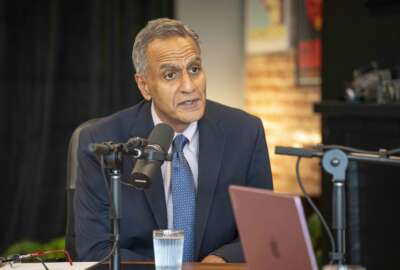DoD official connected to dogfighting ring replaced
In today's Federal Newscast: The Technology Modernization Fund Board awards $3.5 million to establish an online "lost and found” registry for unclaimed retirement...
- The White House is losing one of its top cybersecurity officials. Kemba Walden will step down as acting National Cyber Director on Friday. Walden took over the reins at the Office of the National Cyber Director after Chris Inglis retired in February. She has overseen agency efforts to implement the new National Cyber Strategy and also led the release of a National Cyber Workforce and Education Strategy over the summer. Harry Coker, a Navy veteran and former intelligence community official, has been nominated to serve as the next National Cyber Director. The Senate Homeland Security and Governmental Affairs Committee is scheduled to vote on Coker’s nomination Wednesday.
- Feds can still change their health plan options over the next month, even if there is a government shutdown. That is because the federal health care program is financed through a trust fund, not congressional appropriations. The Office of Personnel Management said there is enough to carry the program through any lapse in funding. Federal employees who may be furloughed or excepted will still receive health care coverage, if a shutdown were to happen. And anyone not paid during a shutdown would see a pause on their insurance payments until after they receive backpay. Congress has to pass either a full-year budget or continuing resolution by midnight Saturday to avoid a shutdown.(What happens to Open Season during a shutdown? - Federal News Network)
- The State Department is calling for annual budget increases to fully replenish its ranks. The State Department is seeing record hiring across its domestic and Foreign Service workforces. That is because Congress approved higher budgets for the past two years. Richard Verma is the deputy secretary of state for management and resources. He said the department needs to keep seeing budget increases through 2030, because up to 13% of the department’s positions, at any given time, remain unfilled. "Just think about it - if you were a business or a company, and 13% of your workforce was not available to you or the positions were unfilled, that would be a major problem,” Verma said. (State Dept sees record hiring, but seeks higher budgets through 2030 to fully replenish ranks - Federal News Network)
- The Technology Modernization Fund Board makes another award to improve citizen services. The Labor Department is receiving almost $3.5 million to establish an online public "lost and found” registry for unclaimed retirement benefits. Labor's Employee Benefits Security Administration (EBSA) said the funding will help over 153 million workers, retirees and their families who are covered by private employment retirement plans, group health plans and other welfare benefit plans, search for retirement programs that may still owe them benefits. Congress mandated EBSA set up this online lost and found in the Setting Every Community Up for Retirement Enhancement or SECURE Act 2.0, signed into law in 2022. This latest award was Labor's fifth from the TMF Board.
- Agencies have started preparing for a lapse in appropriations. Last Thursday, the Office of Management and Budget initiated the planning process as required by Circular A-11. As part of the planning, agencies were told to review and update their shutdown plans, and share a draft communication template to notify employees of the status of appropriations. Congress has until Saturday at midnight to pass a continuing resolution to avoid a government shutdown. House lawmakers are expected to take up the current continuing resolution today. The bill would extend funding for some agencies and programs until Jan. 19 and continue funding for others until Feb. 2.(House Republicans look to pass two-step package to avoid partial government shutdown - Federal News Network)
- Air Force Secretary Frank Kendall said the budgetary uncertainty and the risk of a government shutdown brings new initiatives to a screeching halt. The Air Force cannot start the dozen or so new programs and initiatives it wants to without Congressional authorization and funding. However, there's a legislative initiative before Congress to let the Air Force start on early phase, low-cost work while it waits for more permanent approval and funding. (Air Force Secretary says new programs brought to ‘screeching halt’ until there’s funding - Secretary of the Air Force Frank Kendall)
- Industry leaders are pushing back against proposed cuts to the lead U.S. cyber agency. In a letter to congressional appropriators, executives from Tenable and more than 20 other companies are urging lawmakers to prioritize funding for the Cybersecurity and Infrastructure Security Agency. They said proposed cuts to CISA, in the House’s fiscal 2024 homeland security spending bill, would weaken network defense efforts and put critical infrastructure at greater risk of cyber attacks. (Letter to lawmakers on CISA funding - Tenable)
- The White House is calling on agencies to make better use of a valuable, but finite resource. The Biden administration released a new strategy to potentially expand access to the radio spectrum that makes cell phones, satellites and GPS possible. The administration is giving the National Telecommunications Information Administration two years to come up with ways to potentially repurpose some spectrum bands. The commercial sector relies on this resource for 5-G connectivity and emerging tech, but it also powers air traffic control, disaster response and national defense.
- Kevin Mulvihill is now the permanent deputy chief information officer for command, control and communications at the Defense Department, after previously serving in the role in an acting capacity. DoD officials are not commenting on his predecessor Frederick Moorefield's employment status, but they say he is no longer in the workplace. Moorefield was arrested and charged in October for his involvement in a dogfighting ring. In this permanent role, Mulvihill provides oversight, policy guidance and strategic direction to modernize the Pentagon’s communications systems and networks.
- The Biden administration's anti-Schedule F proposal is gaining support in Congress. In a letter Monday, House and Senate Democrats lauded the Office of Personnel Management for its recent proposed rule. It aims to reinforce existing protections for the career federal workforce. And it is a direct attempt to block the possible return of Schedule F. That is a past executive order from former President Trump that aimed to make tens of thousands of feds easier to fire. The Democratic lawmakers added that they are still aiming to pass a bill to prevent Schedule F's potential revival in future administrations. (Letter on OPM proposed rule - Sen. Tim Kaine (D-Va.) and Rep. Gerry Connolly (D-Va.))
Copyright © 2025 Federal News Network. All rights reserved. This website is not intended for users located within the European Economic Area.
Peter Musurlian
Peter Musurlian is a producer at Federal News Network.
Follow @PMusurlianWFED
Related Stories
State Dept sees record hiring, but seeks higher budgets through 2030 to fully replenish ranks
House Republicans look to pass two-step package to avoid partial government shutdown
Related Topics






